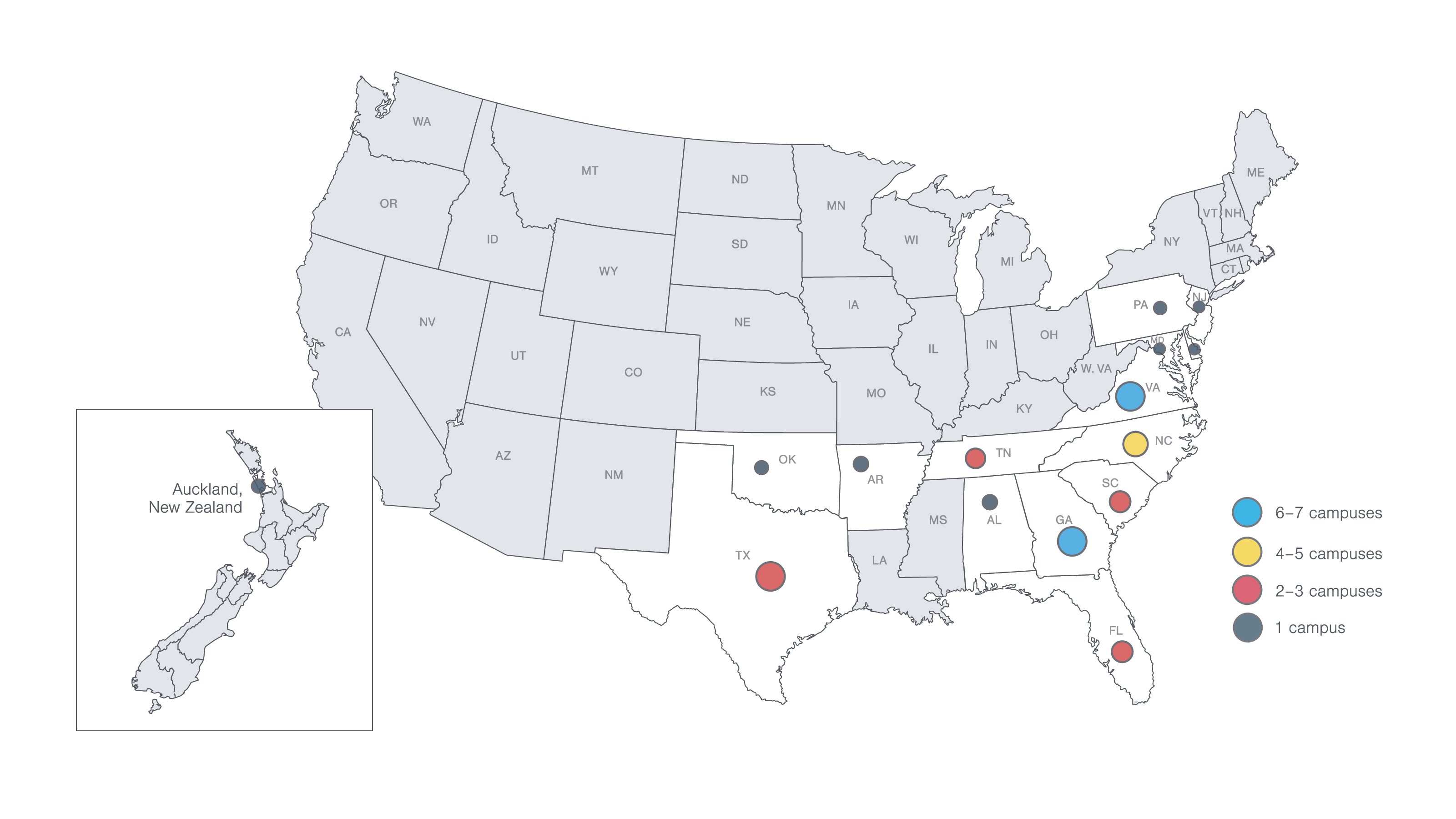Here’s a no-cost way to complete gen eds. Get details
Online Bachelor of Science in Criminal Justice
PROGRAM AT A GLANCE
Why earn a degree in criminal justice administration?
Get ready to expand your knowledge of the criminal justice process with a Bachelor of Science in Criminal Justice, Criminal Justice Administration concentration from Strayer. Learn how law enforcement, corrections, juvenile justice and courts work to support our communities and bring criminals to justice.
Your path to leadership in criminal justice starts here
Expand your understanding of how criminal justice agencies operate – and the leadership needed to help guide them. Strayer’s Bachelor of Science in Criminal Justice, Criminal Justice Administration concentration explores how police, courts and corrections work together to prevent and respond to crime at the local, state and federal levels. You’ll examine topics like corrections, comparative criminal justice and advanced law enforcement.
Why choose Strayer for a Bachelor of Science in Criminal Justice, Criminal Justice Administration?
A Strayer degree can help prepare you for career opportunities in criminal justice administration while offering support, flexible learning options and career planning every step of the way.
- Learn evidence-based techniques for investigating and preventing crime
- Understand the causes of crime and its effects on our global society
- Discover how the different arms of the U.S. criminal justice system – police, courts and corrections – work together at the federal, state and local levels
- Think critically to effectively investigate crimes, enforce laws and implement corrections
- Expand your knowledge of criminology and the operational and technical aspects of the criminal justice process
Earn your degree from an accredited university
Strayer University is an accredited institution and a member of the Middle States Commission on Higher Education (MSCHE or the Commission) www.msche.org. Strayer University’s accreditation status is Accreditation Reaffirmed. The Commission’s most recent action on the institution’s accreditation status on June 22, 2017 was to reaffirm accreditation. MSCHE is recognized by the U.S. Secretary of Education to conduct accreditation and pre-accreditation (candidate status) activities for institutions of higher education including distance, correspondence education, and direct assessment programs offered at those institutions. The Commission’s geographic area of accrediting activities is throughout the United States.

Bachelor of Science in Criminal Justice in Criminal Justice Administration cost breakdown
- 40 courses, $1555 per course
- $65 technology fee each term
- $150 one-time degree conferral fee
- $100 resource kit per course
Estimate the cost of your degree
How much does a Bachelor of Science in Criminal Justice in Criminal Justice Administration cost?
Estimate the cost of your degree
How much does a Bachelor of Science in Criminal Justice in Criminal Justice Administration cost?
Expected Graduation
...
Approximate Total
...
*Student is required to take two courses per quarter during disbursement period
PREPARING YOUR RESULTS
Time commitment
Calculate the approximate time commitment of your degree.
| Course load | ... courses/term |
| Classroom time | ... hours/week |
| Terms per year | ... terms |
| Terms to graduation | ... terms |
Cost analysis
Calculate the approximate cost of your degree
| Tuition | ... |
| Books | ... |
| Fees | ... |
| No-cost gen ed | $0 |
| Transfer credits | ... |
| Transfer Credit Scholarship | $0 |
| $4K scholarship | $0 |
| Strayer Learn and Earn Scholarship | $0 |
| Approximate total | ... |
Opportunities to save on tuition
Employer Tuition Assistance
More than 500 organizations invest in their employees by partnering with Strayer University to offer access to discounted education programs.
The Strayer Learn and Earn Scholarship
For every three courses you pass, earn one on us, tuition-free, to be redeemed at the end of your program with the Strayer Earn and Learn Scholarship. Eligibility rules and restrictions apply. Connect with us for details.
Save up to $15,250 on your bachelor’s degree
As a Strayer student, you have access to no-cost gen ed courses through our affiliate, Sophia. Take up to two online Sophia courses at a time and transfer eligible courses towards your undergraduate degree.
*Savings assumes transferring 10 courses taken at Sophia. Eligibility rules apply. Connect with us for details.
Explore courses in Strayer’s Bachelor of Science in Criminal Justice, Criminal Justice Administration
Gain a deeper understanding of how criminal justice systems operate, both in the US and internationally. In this concentration, you’ll examine the field of corrections. You’ll delve into the agencies, practices and policies that shape prisons, jails, probation and parole. The curriculum also explores the growing challenges of transnational crime and justice, covering topics like human trafficking, cybercrimes and terrorism.
Criminal Justice Administration concentration courses
Examine the organization and practice of the Department of Homeland Security and the terrorist threats that dictate its operations. Topics include foundations of homeland security, terrorism, countermeasures and response to terrorist threats.
This course examines various crime and delinquency prevention policies and programs. Topics covered include the historical development of crime and delinquency prevention methods, theoretical applications to prevention efforts, and research findings on program effectiveness. Students are exposed to the importance of research design in evaluating effective prevention strategies as well as the relationship between fear of crime and victimization. You have options: choose this course, or CRJ310 Law Enforcement Operations and Management.
This course provides a broad range of topics relevant to criminal behavior and the development of the personality. Biological, psychological, and social structural factors which influence the possible origin of criminal behavior, as well as criminal justice and societal approaches for preventing crime are addressed.
course provides a comprehensive overview of the field of corrections. It explores agencies, practices, and polices relevant to prisons, jails, and probation and parole. Students examine both historic and contemporary punishment policies in the United States, sentencing structures, socio-political economic conditions that influence disparate sentencing and confinement, facility designs and how they correlate with inmate management philosophies, the legal aspects of the care, custody and control of inmates, the constitutional rights and civil liberties of inmates, security operations, and inmate treatment services.
This course focuses on theoretical and practical applications to reactive and proactive measures of law enforcement as well as addressing the organization and hierarchy of command with modern policing in the United States. Students will address the history, objectives, and rules regarding investigation and evidence collection associated with policing, with a strong emphasis on field training.
FAQs
How does online learning work?
Complete your degree from where you live, on your time, in a flexible, 100% online program. Using our online portal, you’ll be able to:
- Access lectures and coursework
- Complete assignments and exams
- Communicate with professors and classmates
- Access student resources and support
What support services does Strayer provide?
From day one, you’ll have a team of advisors and coaches to help you balance college, work and your personal life. Tap into support resources online or at a campus near you.
You’ll have access to:
- Admissions and enrollment support
- One-on-one academic coaches
- Financial guidance and potential cost savings
- Career planning services
Criminal Justice faculty
The faculty at Strayer University bring years of real-world industry experience to the classroom, offering valuable insight and practical knowledge. They are committed to supporting your professional goals and are responsive to questions and concerns through the virtual courseroom.
Apply for your Criminal Justice Administration degree today
An admissions officer can help you choose the right program, register for classes, transfer credits and find cost-savings opportunities.
Here’s what you’ll need to get started:
Spring classes start on April 6
Learn more about Strayer University’s admissions process.
Transferring to Strayer from another university?
Your bachelor’s degree from Strayer could be 70% complete when you transfer up to 28 classes.
Strayer welcomes international students
Strayer University is proud to have hosted more than 4,000 international students from over 110 countries. Earn your degree in the U.S. or completely online in your home country – it’s your choice.


Campus locations
Come to a campus near you for guidance and support. You’ll have access to helpful resources, a supportive community and plenty of spaces to learn and grow.
Ready to take the next step?
Your admissions officer is here to guide you through every step of the process, from completing your application to choosing your concentration.
